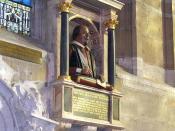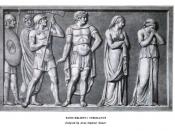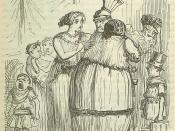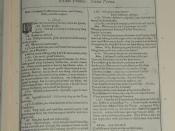Absolutely Absolutism.
Political structure. Undoubtedly, it is something that affects an entire community. Its role is crucial in that decisions must be made "to keep the good of the people." (Cicero, 2005, p.1) Coriolanus, a tragedy by William Shakespeare, takes place during a time of war in ancient Rome. At this time, republicanism was relatively new in society, only having been around for twenty years. Tone, an important factor in the comprehension of literature, shows the "attitude of the author towards the subject matter." Shakespeare immediately introduces contradiction between the plebeians and patricians in the first scene. Absolutism versus republicanism - an unavoidable theme of Coriolanus. Applying the concept of tone, how does Shakespeare feel? More importantly, does Shakespeare side with republicanism or absolutism? Through an analysis of Shakespeare's Coriolanus, along with evidence from Cicero and Machiavelli, one may conclude that Shakespeare favours absolutism over republicanism. Particularly: the commoners are characterized as fickle, selfish, and uneducated, suggesting that power to the people will lead to corruption; Shakespeare's main historical source, Plutarch's Life of Coriolanus, is a veneration of Coriolanus; and Shakespeare gives the protagonist, Coriolanus, a moral temperament, implying that an absolutist leader is better;
In Shakespeare's plays, a recurring theme is the fickleness of the plebeians.
Shakespeare portrays the commoners as easily swayed, uneducated, and never satisfied. Accordingly, Coriolanus commences on a street with a rowdy crowd demanding "for corn at their own rates, whereof they say the city is well stored." (I, i, l. 189-191) The plebeians were in agreement to "kill him (Coriolanus) and have corn at their own price." However, a story about a belly by Menenius easily changed their opinions and thoughts, showing how easily they are persuaded. Machiavelli concludes that:
"Let a prince, therefore, win victories and uphold his state; his methods will always be considered worthy, and everyone will praise them, because the masses are always impressed by the superficial appearance of things, and by the outcome of an enterprise." (Machiavelli, p.20)
People are easily pleased because they can change their minds quickly. They do not care for any factual evidence - one that pleases, even by hypocrisy, will win the vote.
Shakespeare provides evidence that if power were given to the people as republicanism suggests, they will never be able to universally agree on issues. Humans are naturally motivated by self-interest. In a republican government, citizens will vote for whatever benefits themselves and when they do not get their ways, they will create a disturbance - comparable to the beginning of Coriolanus. Power to the people would corrupt society. An illustration of this is given by Shakespeare's hundred-headed monster:
"We have been called so of many; not that our heads are some brown, some black, some abram, some bald, but that our wits are so diversely colored. And truly, I think, if all our wits were to issue out of one skull, they would fly east, west, north, south, and their consent of one direct way should be at once to all the points o' th' compass." (II, iii, l. 18-25)
Shakespeare allows one of the citizens to make a legitimate argument that there will be different point of views even if everyone was made as a whole (as republicanism suggests). Coriolanus, an absolutist, is given an important speech the audience first encounters his character.
"What would you have, you curs, that like not peace nor war? ...You are no surer, no, than is the coal of fire upon the ice, or hailstorm in the sun. ... With every minute you do change a mind, and call him noble that was now your hate" (I, i, l. 170-184)
Though harsh and callous, Coriolanus gives many strong points against republicanism. Firstly, he acknowledges that citizens are neither happy - in times of peace, they complain about famine; in times of war, they complain about fighting. The plebeians are never pleased and virtually, never will be. Furthermore, the commoners are still debased because, "with every minute you do change a mind." (I, i, l. 183) This is seen when Brutus and Sicinius convince the commoners to exile their hero. Also, Shakespeare gives us two speakers to support aristocracy: Menenius, who uses humour and analogy, and Coriolanus, who is harsh and direct. This repetition stresses the theme that republicanism fails. The commoner's feeble minds hinder their ability to run themselves, let alone run the entire state. In conclusion, the plebeians are motivated by self-gratification, never content, and do not know what they want. This is a synecdoche of republicanism and how it will corrupt. Shakespeare surely did not support a corrupted political administration.
Shakespeare's Coriolanus was borrowed from Plutarch's Lives of the Noble Grecians and Romans. This was a historical analysis of Coriolanus as a noble and moral absolutist leader. By writing Coriolanus, Shakespeare "was engaged in a total imaginative act, seeking to satisfy his sense of the hero's character, and for his complex 'feel' of the dramatic world that was coming into being as he wrote". (Brower, p.153, 2002) Since Coriolanus is a large part of Shakespeare's "imaginative act", characters have an implication on his tone.
I shall lack voice: the deeds of Coriolanus should not be uttered feebly. It is held that valor is the chiefest virtue and most dignifies the haver... Our then dictator, whom with all praise I point at, saw him fight... He proved best man I' th' field. (II, ii, l.83-85)
Here, Cominius speaks of Coriolanus' greatness. These were all ideas borrowed from Plutarch that were emphasized in a lengthy speech by Cominius. (Brower, p.154) Shakespeare continually portrays Coriolanus as a hero, although he dies. His victories in wars are glorified numerously.
Men marveling much at his constancy, never overcome by pleasure nor money and how he would endure all manner of pains and travails, there upon they well liked and commended his political stoutness and temperance. (Broward, p.160)
This excerpt conspicuously describes Plutarch's admiration of Coriolanus as a noble Roman. Shakespeare's textual source for his main character has substantiating evidence for Coriolanus as a valiant political leader. Shakespeare does not try to distort Coriolanus' character. Instead, he agrees with Plutarch and all arguments considered, absolutism absolutely prevails.
If Shakespeare intended to encourage republicanism, he would have never made the protagonist, Coriolanus, a moral character. He is illustrated not only as an absolutist, but a tragic hero - one that makes the ultimate sacrifice for his beliefs. Arguably, Shakespeare suggests that an elite ruling class, of which Coriolanus is a part of, is better than a rule by uneducated citizens. Cicero, renowned for his oratorical skills and analysis, says in his "Prescription for Political Administration," that, "First, to keep the good of the people so clearly in view that regardless of their own interests they will make their every action conform to that." (Cicero, p.1, 1967) Fundamentally, the state should come first. Coriolanus, without a doubt, demonstrated pietas.
He will dedicate himself unreservedly to his country, without aiming at influence or power for himself; and he will devote himself to the state in its entirety in such a way as to further the interests of all... he will submit to any loss, however heavy, rather than be untrue to them, and will face death itself rather than renounce them. (Cicero, p.1)
When the Volces declared war against Rome, Coriolanus immediately knew what to do and prepared for battle. He inevitably acknowledged the possibility of his death in combat, but he showed no hesitation - the state must come first. After his banishment, he was en-route to avenge Rome with the enemy. However, he ultimately kept peace (listening to his mother) and as a result, this tragic hero realized his faults and willingly died for the state. He was ultimately moral and therefore, alluding to Cicero, the political administration was expedient. (Cicero, p.3) Shakespeare remarkably ends the play by saying, "Yet he shall have a noble memory." (V, vi, l.154) He requests that the audience remembers Coriolanus as a good ruler, representing an efficient political structure - the one Shakespeare approved.
Shakespeare's tone is one that delineates his support for absolutism. "Though there the people had more absolute pow'r, I say they nourished disobedience, fed the ruin of the state." (III, i, l.116-118) The state will decline if power is given to the people. Shakespeare clearly underlines the problem with the commoners. They cannot function in unity as one of the citizens identifies. Citizens are selfish and when hardships arise, they just complain. They are not intellectually able to understand their needs as well as the government's. A moral absolutist leader will know what is best for the people, just as Coriolanus was able to win battles and protect Rome from Volscians. Coriolanus was a moral leader, who although had poor speaking skills, served his country to epitomize the virtues of pietas and valor. He surely made mistakes in his leadership, but nevertheless, he performed his duties morally. Shakespeare implicates the decency of the absolutist leader. He never compliments republicanism - the main ideas shows the foolishness of the commoners and the fact that when power was given to the people, the state ruined. This semi-historical play was written because Shakespeare wanted to release his feeling against republicanism. It came from Plutarch's commends about the nobility of Coriolanus. Shakespeare respects Plutarch's view and does not satire his subject at all - Coriolanus represents a hero and one that should be never forgotten.
Nobody ever saw or knew in the real world, for there's such a difference in the way we ought to live that the man who neglects the real to study the ideal will learn how to accomplish his ruin, and not his success. (Machiavelli, p.18)
Shakespeare described the heroism of an absolutist that viewed leadership as a role to control others. He followed Cicero's moral instructions, but also did what was "right" and pragmatic. This is the "real truth of the matter." (Machiavelli, p.18)





